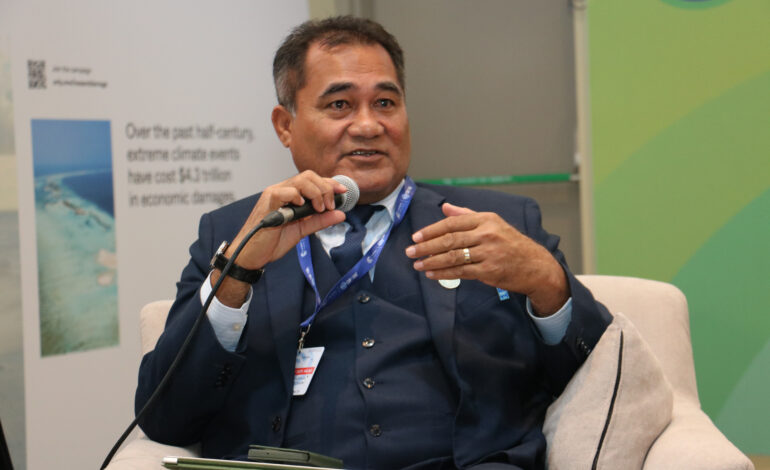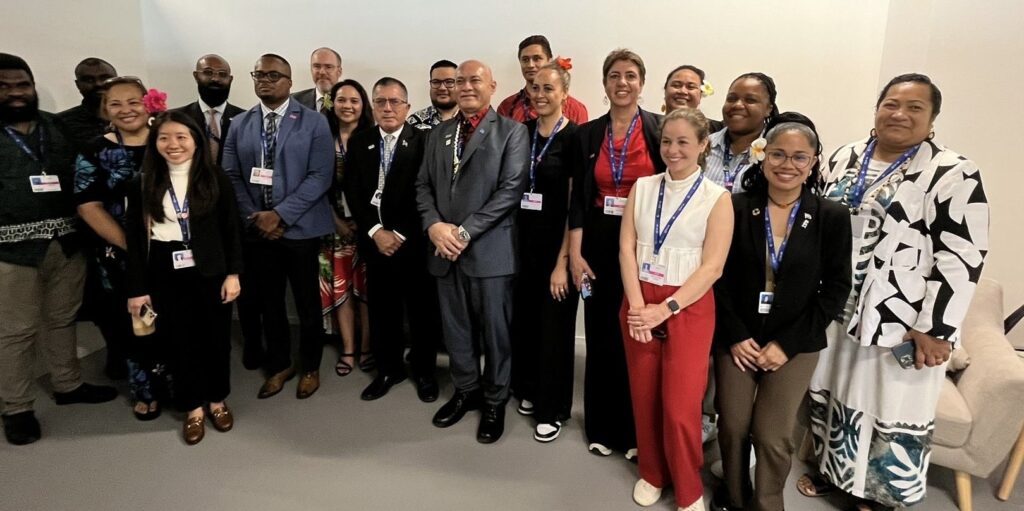The Alliance of Small Island States (AOSIS) calls on countries at COP28, the international climate conference underway in Dubai, United Arab Emirates, to urgently accelerate their work, particularly on the Global Stocktake (GST).
In a statement, AOSIS said the most vulnerable “are running out of time to safeguard their populations from more devastating climate change impacts.”
AOSIS comprises small island states globally, including the Pacific, the Caribbean, the Indian Ocean, and the South China Seas.
In addition to the Least Developed Countries (LDCs) bloc, the negotiating bloc cautioned that while the conference has had significant wins so far, countries must not be complacent at COP28.
The Global Stocktake is a three-part process that began in 2021 to assess the global response to the climate crisis every five years, with the first-ever Stocktake slated to conclude within the next week at COP28.

It evaluates the progress of slashing greenhouse gas emissions, building resilience to climate impacts, and securing finance and support to address the climate crisis.
“If we fail in this task of achieving a strong Global Stocktake outcome, we make it significantly more difficult to leave this COP saying we can achieve the 1.5°C limit,” said AOSIS chairman and the Samoan Minister of Natural Resources and the Environment Cedric Schuster.
He added, “If we fail, the consequences will be catastrophic.”
“AOSIS calls on major emitters to enhance their commitments, including aligning their NDCs with the 1.5°C goal, leading the way on fossil fuel phase-out, phasing out all fossil fuel subsidies, and ensuring peaking of global emissions before 2025 and halving them by 2030, transitioning to global net zero global emissions by 2050, with developed countries taking the lead,” Schuster also said.
According to AOSIS, the intense negotiations are continuing slowly following a ministerial meeting on Wednesday to brief Ministers on developments at COP28.
T’&T’s Minister of Planning and Development, Pennelope Beckles, attended this briefing.
So far, COP28 has celebrated the achievement of the adoption of the Loss and Damage Fund, with countries pledging approximately US $750 million at this point.
However, according to AOSIS, small islands are asking for developed countries to lead the capitalisation of this fund, with a goal of US $1 billion per annum. AOSIS has emphasised that while the pledges are encouraging, countries must continue to work urgently to create processes that provide efficient, direct access to vulnerable communities.

“The operationalisation of the Loss and Damage Fund is a first step, but we need more,” said Madeleine Diouf Sarr, chairman of the Least Developed Countries.
“We have to continue pushing because this is why we are here. We do it for the men, women, and children of our homes. From SIDS to LDCs, we are paying the high cost. Climate change is not fair and we must course correct,” Sarr noted.
Meanwhile, on Wednesday, the end of the first week of COP28, the executive secretary of the United Nations Climate Change Simon Stiell said, “The win on Loss and Damage here in Dubai gave this COP a spring in its step. But it is just a start. Now all governments must give their negotiators clear marching orders: we need highest ambition, not point-scoring or lowest common denominator politics.”
He added, “Loss and damage was a win, but we’re kidding ourselves if we think it’s a tick in the box for finance and support at this COP; more is required.”
Stiell said that by the end of next week, COP28 needs to deliver a bullet train to speed up climate action, “It’s time for governments and negotiators to pick them up and put them to work.”
This story was published as part of Climate Tracker’s COP28 Climate Justice Reporting Fellowship